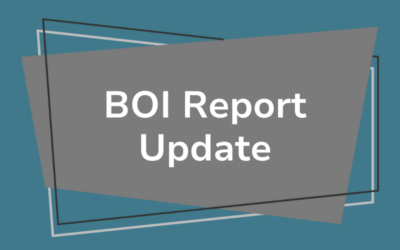Every single business owner goes through periods where they’ve lost their oomph.
Sometimes, it’s due to a struggling business. Perhaps that growth curve has stagnated (or flatlined) or the feedback you’re getting is that your product is all wrong. Perhaps your team is in conflict. Perhaps your expansion has failed, and you’re having to go through layoffs or cutbacks or stop the growth of a new division.
Oomph goes away for other reasons. One friend of mine found herself without the oomph to keep going because her business had succeeded. She had spent years pursuing financial freedom, and when she finally reached it, she felt like she lost her drive. Her purpose was gone. Another friend of mine felt like his business had gone in a new—and very successful—direction, but that new direction didn’t align with his strengths.
A more formal term for “losing your oomph” is burnout. The concept was developed by Christina Maslach, a professor of social psychology at UC Berkeley. She talks about burnout as a state of chronic stress that leads to:
- Physical and emotional exhaustion
- Cynicism and detachment
- Feelings of ineffectiveness and lack of accomplishment
Understanding the Basics of Entrepreneurial Burnout
Burnout is not depression, and it isn’t a simple result of long hours. Burnout is no longer caring, no longer having energy, and no longer feeling like our efforts matter. It is sustained exhaustion and deflation. The recipe for burnout is chronic stress without social support, without meaningful goals, and without much control over how we carry out our work.
Burnout makes us suck at our work. It is toxic to productivity, creativity, complex problem solving, interpersonal relationships, and motivation. If you’re serious about shipping, you simply can’t afford burnout in yourself or your team. I’m not saying this lightly, either—there is solid, tested research that shows that burnout can greatly affect productivity for any individual.
Recently researchers have shown that burnout has the power to change the function, structure, and chemistry of the brain. By looking at neuroimaging of brains of folks who were feeling burned out, scientists found that burnout is associated with enlarged amygdalae, the part of the brain that regulates negative feelings like fear and anxiety. Additionally, the imaging showed decreased connections between the amygdalae and the anterior cingulate cortex, which is the part of the brain that regulates emotional distress.
These small structural changes can cause people to feel a heightened level of negative emotions and then have a hard time calming down from those feelings, causing the cycle to spiral further and further downward over time. This cycle can lead to struggles in productivity, but also in memory, attention, and anxiety.
If brain changes aren’t enough to freak you out about burnout, a team of researchers at Tel Aviv University tracked health screenings of 8,838 employees for an average of 3.4 years. They found that people who demonstrated high levels of burnout had a 79% higher risk of being diagnosed with heart disease over the course of the study. Yikes!
Unfortunately, for most, burnout creeps up slowly and in a way that is easy to miss and easy to ignore. Many entrepreneurs don’t realize they are dealing with burnout until it is already affecting their productivity. It starts with a high-stress, high-impact job. This stressful environment coupled with low social support, no clear or meaningful goals, too much work, few observable successes, and limited control causes burnout. A mismatch between what we think is important and the demands of our workday quickly creeps in, and burnout begins.
Burnout and the Entrepreneur
Entrepreneurs are particularly susceptible to burnout because many of us work alone or on small teams. As a group, we tend to value personal freedom and control so much that we are vulnerable to deep discouragement and frustration when confronting problems that are beyond our control.
Ironically, many of the most people I know with entrepreneurial burnout are very successful. Their companies are growing, but the growth is taking them away from their competence and their sweet spots (the life of a CEO running a 15-person team is very different than the life of a freelancer or solopreneur or someone running a team of three carefully selected people. To go from freelancer to CEO in two years is a popular dream, but it may be a recipe for burnout.
If we think about the core values that drive entrepreneurs—freedom, ingenuity, adventure, and meaning—we can make the assumption that a founder will lose that oomph when those values aren’t being met in their lives. Likewise, part of the nature of running a start-up or business is that there will be times when you will lose your freedom, when your sense of ingenuity is stifled, or when the adventure starts to feel monotonous and your meaning is muted by the stress of your business. So, with some simple A+ B=C math, it becomes pretty obvious that every entrepreneur will face burnout at some point in his or her career.
What to Do When Burnout Hits
1. Celebrate Successes
Take the time to honor what is going well. Because burnout can shift the way that your brain is functioning, it can be easy to see only the downside. Intentionally practice noticing the wins, the progress, the growth, and the high points in your business. This helps to counterbalance that overactive amygdala.
2. Define Your Goals
Clear, focused goals allow us to celebrate success. Because a big part of burnout is feeling like you’re not accomplishing anything, segmenting your work into small, clear, achievable goals can help bring a reality check to your biased view that nothing is getting done. In addition, our brains get a little jolt of happy endorphins when we experience the success of finishing something. This also helps counteract that overactive amygdala.
Not sure how to get make goal setting a meaningful part of your work life? Want some new goal-setting strategies?
We interviewed a bunch of successful founders about how they do it: Check out ZenFounder.com podcast episodes 51-56.
3. Quit Doing Things That Suck the Life Out of You
No one is able to spend a lot of time doing something they don’t care about—time on the hamster wheel makes anyone, but especially an entrepreneur, feel depressed and burned out. So once you find out what your strengths and passions are, the next thing you need to do is stop doing the things that aren’t in that wheelhouse. Or at least stop doing them so much.
One founder friend of mine had a small business that was really thriving. Everything seemed to be going well—revenue was pouring in, his product was getting rave reviews, his team was growing—but he felt like he was ready to give up. He was so burnt out that he had trouble getting up in the morning and the idea of going into his office felt daunting. He began to wonder if he should sell his business and go back to his old 9 to 5 job.
After some careful contemplation, though, he realized that his exhilaration and drive came from time spent problem-solving and finding solutions to big problems. He loved coming up with solutions and technology that helped other businesses thrive. What he didn’t love was the day-to-day management of the office. He isn’t a gifted administrator, and the idea of running an actual business made him feel completely burnt out.
The easy solution was that he hired a manager to run the day-to-day aspects of his business so he could hole-up with the development team and create. He got that oomph back, and his business continued to thrive.
When you feel like you’ve lost that oomph, the solution is not to keep pressing forward. Burnout is your body and soul telling you that you need a break. It may be time for a vacation or a sabbatical. Continuing to push once you’ve reached the point of burnout will only solidify the negative patterns and dangerous physiological changes. Take time to re-evaluate and ask yourself some deeper questions.
At a minimum, go on a retreat. Let yourself step away from the urgent to evaluate the important.
The good news is that it is absolutely possible to recover from burnout, even on a neurological level. But you have to rest.
4. Connect
We are a social species. We can’t thrive in isolation. Burnout is inherently isolating- part of burnout is detachment from customers, colleagues, and loved ones. The only road back is to counteract the isolation by deciding to pursue connection. Easier said than done. Masterminds and entrepreneurs groups are a great way to get started. You are not alone in your struggles with burnout.
In order to make connecting easy, we created ZenTribes. These are groups of 6-8 entrepreneurs who join together for focused conversation about how to stay sane and healthy in the midst of the ups and downs of business life. Whether you join one of our tribes or find your way to another community. Connection is a necessary part of burnout prevention and burnout recovery.
5. Stick to What is Most Meaningful
The last suggestion is to stop and ask the big question. Why are you doing what you are doing? What is the meaning that drives your business? We can do hard things when we believe those things are meaningful. Burnout can signal that you’ve moved too far from the meaning that originally motivated you. Or perhaps life has changed and the meaning that once drove you is no longer relevant. It’s time to go back to the drawing board and re-evaluate what is most important to you right now.
Entrepreneurial burnout is common. And it is terrible. The good news is that it is possible to recover.




